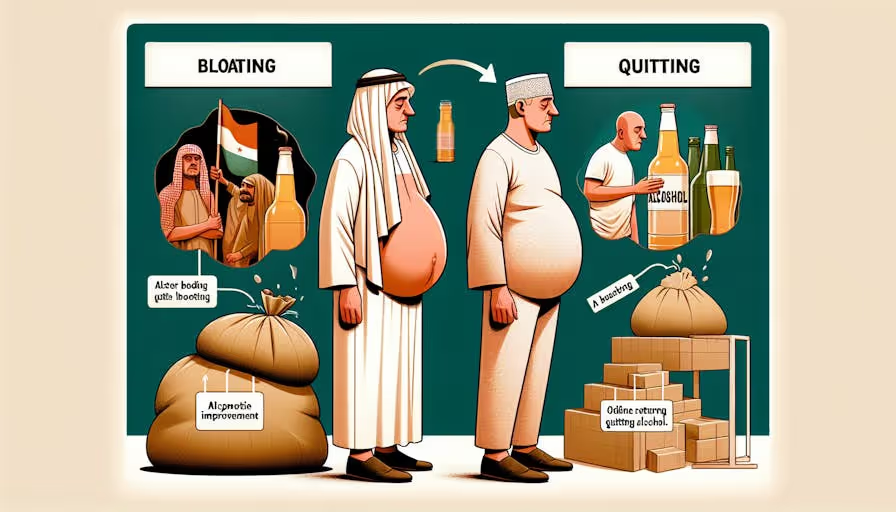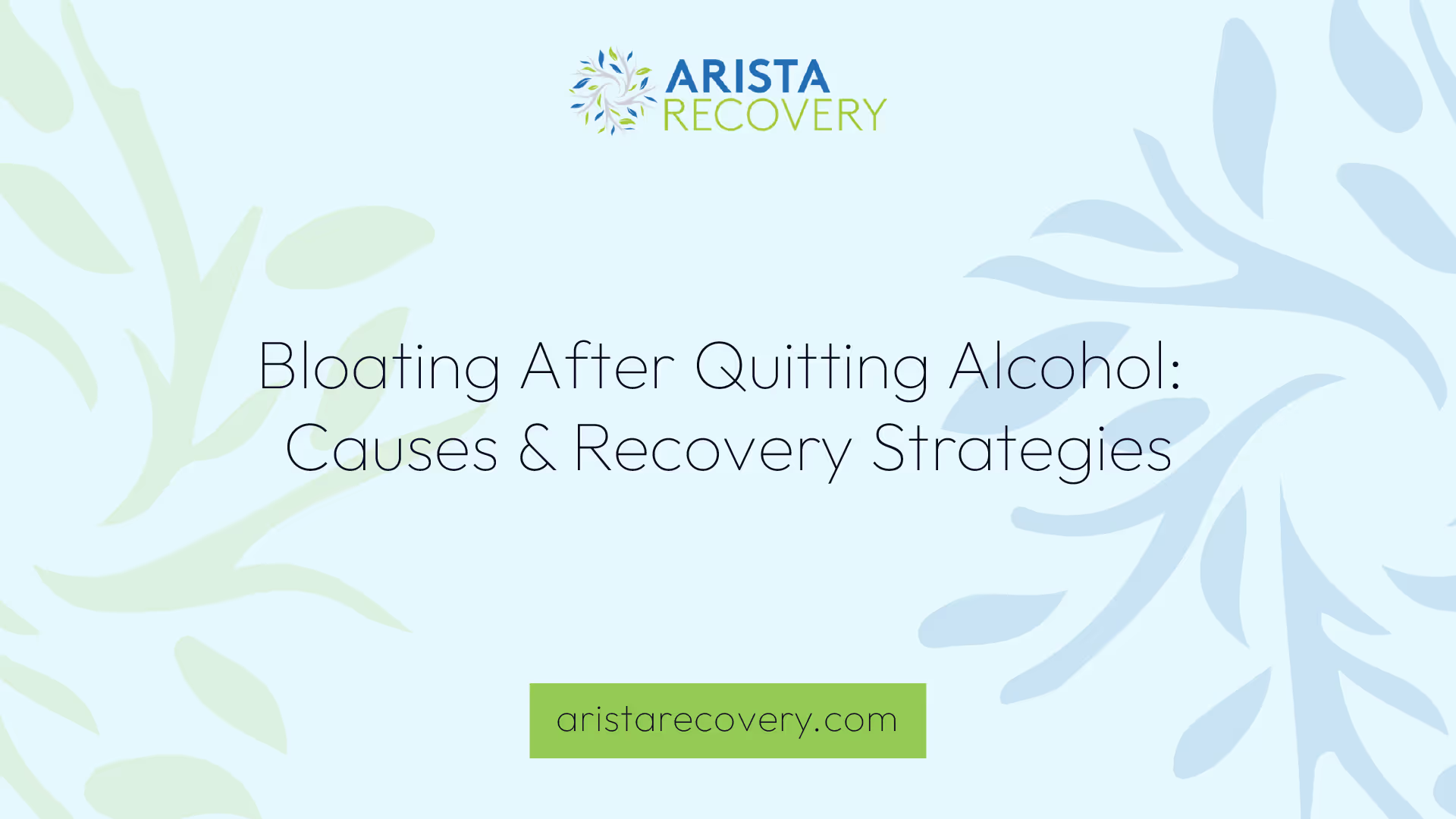Bloating After Quitting Alcohol: Causes & Recovery Strategies

Understanding Bloating Post-Alcohol
Bloating is a common concern for individuals who have recently decided to quit drinking alcohol. The discomfort and bloating that some individuals may experience after they stop drinking alcohol can vary in severity and duration, contingent on factors like the amount of alcohol previously consumed and individual differences in digestion and overall health.

Causes of Bloating After Quitting
Bloating after quitting alcohol can occur due to various reasons, including an increase in fiber intake and changes in gut bacteria, leading to excess gas production. Alcohol can irritate the gastrointestinal (GI) tract, causing inflammation, changes in gut function, and affecting the muscles that control food movement through the digestive system, potentially leading to delayed gastric emptying and bloating.
Additionally, stopping drinking suddenly can also cause digestion issues, such as stomach pain, nausea, and indigestion, in addition to bloating [1]. Bloating after quitting alcohol can be the result of an increased intake of carbonated drinks or eating more processed foods to replace the calories from alcohol. This can lead to added air and gas in the GI tract, contributing to bloating.
Moreover, when a person quits alcohol, it can affect the balance of bacteria in the gut, leading to changes in digestion that may contribute to bloating. Bloating after quitting alcohol may be influenced by the overall changes in diet that can occur, such as eating more high-FODMAP foods or increasing fiber intake rapidly, both of which can lead to bloating.
Duration of Bloating Symptoms
Bloating is a common symptom after quitting alcohol, but it is usually temporary as the body adjusts to the changes in alcohol intake. The duration of bloating symptoms can vary widely, depending on individual health factors, dietary changes, and the level of alcohol consumption prior to quitting.
It's important to stay hydrated when quitting alcohol to help prevent bloating. Dehydration can slow down digestion and lead to bloating, so staying well-hydrated is crucial [4].
In conclusion, while bloating can be an uncomfortable side effect of quitting alcohol, it is typically temporary and can be managed with dietary changes, hydration, and patience as the body adjusts to the absence of alcohol.
Physical Impact of Alcohol
Understanding the physical impact of alcohol on the body provides insights into why bloating after quitting alcohol may occur. It's essential to comprehend alcohol's effect on hydration and the digestive system.
Alcohol's Effect on Hydration
Alcohol acts as a diuretic, increasing urine production and potentially causing dehydration. This disruption in fluid balance can lead to water retention, a common cause of bloating [4].
Alcohol and the Digestive System
Alcohol can irritate the gastrointestinal (GI) tract, causing inflammation, changes in gut function, and affecting the muscles that control food movement through the digestive system. This may result in delayed gastric emptying and bloating.
Quitting alcohol can also affect the balance of bacteria in the gut, leading to changes in digestion that may contribute to bloating. These changes can be influenced by the overall changes in diet that can occur, such as eating more high-FODMAP foods or increasing fiber intake rapidly, both of which can lead to bloating.
In conclusion, both hydration and digestive processes are affected by alcohol consumption and cessation, contributing to bloating after quitting alcohol. Understanding these impacts aids in managing this symptom during recovery.
Coping with Bloating
Dealing with bloating after quitting alcohol can be challenging, but there are several strategies that can help manage this common symptom. Key methods include making dietary changes to reduce bloating and maintaining adequate hydration.
Dietary Changes to Reduce Bloating
Bloating after quitting alcohol can be influenced by overall changes in diet. For instance, an increased intake of carbonated drinks or eating more processed foods to replace the calories from alcohol can lead to added air and gas in the GI tract, contributing to bloating.
Additionally, eating more high-FODMAP foods or increasing fiber intake rapidly can lead to bloating. FODMAPs are types of carbohydrates found in certain foods, including wheat, onions, and some fruits. They can cause issues in the gut, leading to symptoms like bloating, gas, and stomach cramps.
To help alleviate bloating, consider:
- Gradually increasing your fiber intake, allowing your digestive system to adjust.
- Limiting the consumption of carbonated drinks and processed foods.
- Limiting high-FODMAP foods and opting for more low-FODMAP foods.
- Including probiotic-rich foods, such as yogurt and kefir, in your diet to promote a healthy gut.
It's also important to note that bloating after quitting alcohol can be a sign of an underlying digestive issue like SIBO (small intestinal bacterial overgrowth) or other conditions that may require medical attention.
Importance of Hydration
Staying hydrated is crucial when dealing with the effects of quitting alcohol. Dehydration can slow down digestion and lead to bloating, so maintaining a good hydration status is essential.
When the body is losing fluids through sweating or urination, it's important to replace those fluids by drinking enough water throughout the day. Additionally, foods with high water content - like fruits and vegetables - can also contribute to your overall hydration.
Remember, while dealing with bloating after quitting alcohol can be uncomfortable, it is usually a temporary symptom. By making dietary changes and staying hydrated, you can help your body adjust to life without alcohol. If bloating persists or is accompanied by other severe symptoms, do not hesitate to seek professional medical assistance.
Professional Help and Resources
While self-management strategies play a vital role in dealing with bloating after quitting alcohol, professional help and resources can provide invaluable support during this phase.
When to Seek Medical Assistance
Bloating after quitting alcohol can be a common symptom. However, if bloating persists or worsens despite lifestyle changes, it's advisable to consult a healthcare provider for further evaluation and guidance. Persistent bloating could indicate underlying health issues that may require medical attention or specific interventions beyond dietary changes and natural remedies.
Healthcare providers can offer recommendations and potential treatment options to alleviate bloating and other withdrawal symptoms successfully. It's essential to consult a healthcare professional for proper assessment and guidance if you're experiencing bloating after quitting alcohol.
Moreover, registered dietitians can also provide valuable insights into managing bloating effectively. They can assess symptoms, offer personalized advice, evaluate underlying conditions, and recommend appropriate treatment options.
Support Groups and Additional Resources
In addition to medical assistance, seeking support from healthcare providers or joining support groups can provide additional guidance and assistance for individuals dealing with bloating and other symptoms after quitting alcohol.
Support groups provide a platform to share experiences, gain insights from others who are going through similar situations, and receive emotional support. These groups can be a source of comfort and motivation during the recovery process.
Likewise, resources from healthcare professionals, such as doctors and nutritionists, can be beneficial for managing bloating and other withdrawal symptoms effectively.
In conclusion, while bloating after quitting alcohol can be uncomfortable, there are several resources and professional help available to manage this symptom effectively. Remember, it's crucial to seek medical assistance if the bloating persists or worsens and to leverage the support available through professional networks and support groups.
Lifestyle Changes for Recovery
As part of the recovery process after quitting alcohol, making certain lifestyle changes can significantly aid in reducing bloating and enhancing overall well-being. These changes encompass physical activities and stress management techniques that promote a healthier digestive system.
Exercise and Bloating Reduction
Incorporating regular exercise into a daily routine can help alleviate bloating after giving up alcohol. Exercise promotes healthy digestion and can help alleviate symptoms of bloating by stimulating the movement of food through the digestive system [1].
Engaging in physical activities, such as walking, jogging, or yoga, can help alleviate bloating. Exercise stimulates the muscles in the digestive tract, promoting regular bowel movements and reducing the buildup of gas in the intestines.
Regular physical activity aids in reducing bloating after cessation of alcohol intake by promoting healthy digestion and preventing constipation. Physical activity stimulates the muscles in the digestive system, allowing for more efficient movement of food and reducing the likelihood of bloating.
Stress Management Techniques
Equally important for reducing bloating after quitting alcohol are stress management techniques. Stress can contribute to digestive issues and bloating, so finding healthy ways to manage stress can support overall digestive health [1].
Managing stress levels through techniques like mindfulness, meditation, or engaging in hobbies can help reduce bloating. Stress can impact digestion and contribute to bloating, so finding healthy ways to cope with stress can support overall digestive health.
Stress management techniques, such as deep breathing exercises, engaging in relaxing activities, or even spending time in nature, can help reduce bloating after quitting alcohol. Stress can disrupt digestion and contribute to bloating, so finding effective ways to manage stress is important for overall digestive health.
In summary, the combination of regular physical activity and effective stress management techniques can greatly aid in reducing bloating after quitting alcohol. These healthy lifestyle changes support the recovery process and contribute to overall wellness.
References
[1]: https://www.medicalnewstoday.com/articles/325778
[3]: https://www.townsendla.com/blog/bloating-after-alcohol
[4]: https://mpowerwellness.com/bloating-after-quitting-alcohol/
[5]: https://www.aspenridgerecoverycenters.com/bloating-alcohol-stomach-withdrawal/
[6]: https://www.northstarbehavioralhealthmn.com/resources/bloating-after-quitting-alcohol
[7]: https://firstcityrecoverycenter.com/resources/how-long-does-alcohol-bloating-last/
You’re not alone in this.
When mental health challenges and addiction intersect, it can feel isolating. At Arista, we offer compassionate, evidence-based, and trauma-informed care to help you heal, grow, and move forward.
You’re not alone in this.
When mental health challenges and addiction intersect, it can feel isolating. At Arista, we offer compassionate, evidence-based, and trauma-informed care to help you heal, grow, and move forward.
Support that moves with you.
You’ve taken a brave first step. At Arista Recovery, we’re here to help you continue with best-in-class care designed for long-term healing and support.
.webp)






